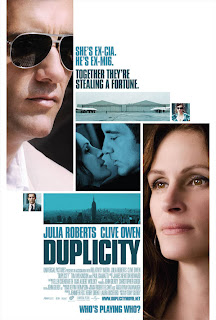 Duplicity (2009). Written and directed by Tony Gilroy. Starring Julia Roberts and Clive Owen. Excellent supporting roles by Tom Wilkinson and Paul Giamatti.
Duplicity (2009). Written and directed by Tony Gilroy. Starring Julia Roberts and Clive Owen. Excellent supporting roles by Tom Wilkinson and Paul Giamatti.
I saw Duplicity in the theaters last month in part because of the positive reviews paired with skeptical press and questions about whether Julia Roberts could still open a movie.  (Questions that angered me enough to express my opinion with my wallet, an action I believe is important.) A recent story clip on MSN compelled me to revisit the movie. The headline “Moneymakers” beside a picture of Julia Roberts, with the byline “Hollywood’s most bankable actresses” links to an article that discusses which actresses can currently be counted on to bring in the bucks. “Moneymaker”, of course, is a term most commonly associated with pornography, prostitution, and the objectification of the female ass, in particular.
(Questions that angered me enough to express my opinion with my wallet, an action I believe is important.) A recent story clip on MSN compelled me to revisit the movie. The headline “Moneymakers” beside a picture of Julia Roberts, with the byline “Hollywood’s most bankable actresses” links to an article that discusses which actresses can currently be counted on to bring in the bucks. “Moneymaker”, of course, is a term most commonly associated with pornography, prostitution, and the objectification of the female ass, in particular.
The actress-as-commodity isn’t anything unusual in the sexist institution of mainstream filmmaking, but describing a popular actress as a “moneymaker” creates a serious problem. While box office numbers (and particularly opening weekend numbers) determine a film’s success and influence executives in terms of which movies are greenlighted, I have to wonder if it’s the actress’ ass alone bringing people into theaters.
Anyhow, on to the movie.
Duplicity expects level of sophistication and intelligence from its audience, which includes the ability to follow a story that jerks viewers from location to location, and from time to time. It’s a romantic comedy, but it makes you think. Maybe this is a problem for box-office bucks, but a little mental effort makes a movie much more enjoyable–for adults, at least.
Thinking about Ripley’s Rule as a litmus test, this movie actually barely passes–if at all. This fact ordinarily is a big problem for me, but in Duplicity it feels like an afterthought. It’s a romantic comedy, but not the kind we’ve become accustomed to.  As a number of reviewers have previously mentioned, this film hearkens back to the screwball comedies of the 1940s, when wit was king, and the women generally matched the men in smarts (that’s not to say that the gender politics were a mess in those movies). What makes the movie good–and so different from other romantic comedies–is that the man and woman are on an even keel. Domination of one or the other sex isn’t the issue. These characters have bigger fish to fry–namely, their bosses in the world of corporate espionage. It’s as if Michael Clayton were remade into a romantic comedy.
As a number of reviewers have previously mentioned, this film hearkens back to the screwball comedies of the 1940s, when wit was king, and the women generally matched the men in smarts (that’s not to say that the gender politics were a mess in those movies). What makes the movie good–and so different from other romantic comedies–is that the man and woman are on an even keel. Domination of one or the other sex isn’t the issue. These characters have bigger fish to fry–namely, their bosses in the world of corporate espionage. It’s as if Michael Clayton were remade into a romantic comedy.
If you aren’t convinced that the movie is worth seeing, the opening credits present the strangest and most hilarious fight scene in recent memory.
Here’s the trailer:
